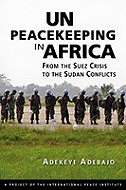UN Peacekeeping in Africa:
From the Suez Crisis to the Sudan Conflicts
|
|
Adekeye Adebajo
|

|

Nearly half of all UN peacekeeping missions in the post–Cold War era have been in Africa, and the continent currently hosts the greatest number (and also the largest) of such missions in the world. Uniquely assessing five decades of UN peacekeeping in Africa, Adekeye Adebajo focuses on a series of questions: What accounts for the resurgence of UN peacekeeping efforts in Africa after the Cold War? What are the factors that have determined the success, or contributed to the failure, of the missions? Does the mandating of so many peacekeeping missions signify the failure of Africa's regional security organizations? And, crucially, how can a new division of labor be established between the UN and Africa's security organizations to more effectively manage conflicts on the continent?
Adebajo's historically informed approach provides an in-depth analysis of the key domestic, regional, and external factors that shaped the outcomes of fifteen UN missions, offering critical lessons for future peacekeeping efforts in Africa and beyond.
Adekeye Adebajo is executive director of the Centre for Conflict Resolution in Cape Town, South Africa. His numerous publications include The Curse of Berlin: Africa After the Cold War, From Global Apartheid to Global Village: Africa and the United Nations, Liberia's Civil War: Nigeria, ECOMOG, and Regional Security in West Africa, and Building Peace in West Africa: Liberia, Sierra Leone, and Guinea-Bissau.
|
|
